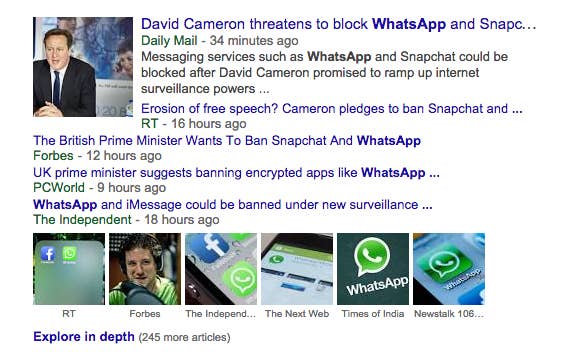In the wake of last week's terror attacks in France, David Cameron yesterday said he wanted Britain's spies to read all messages sent across the internet – and nearly every news publication suggested he would ban WhatsApp.

The next government will have to legislate again in 2016. If I am prime minister I will make sure that it is a comprehensive piece of legislation that does not allow terrorists safe space to communicate with each other. ...
In our country, do we want to allow a means of communication between people which even in extremis, with a signed warrant from the home secretary personally, that we cannot read?
That is why in extremis it has been possible to read someone's letter, to listen to someone's telephone, to mobile communications.
But the question remains: are we going to allow a means of communications which it simply isn't possible to read. My answer to that question is: 'No we must not'.
Encryption is used by most websites that ask for private information in order to protect an individual's information being easily accessible.
It's used when you log in to check your bank details, it's used when you shop online and it's used when you sign in to a government website, amongst a host of other websites that also encrypt your data.
Although he didn't mention WhatsApp, Snapchat or encryption directly, it was clear that Cameron was referring to any online communication that was encrypted.
And now the prime minister wants intelligence agencies to know even more about you.
David Cameron and the Conservative party have already put forward a fairly strong stance on counter-terrorism, which promoted a so-called Snooper's Charter, which would allow the government access to everyone's metadata – who you emailed or texted, what time you did that, from where you sent the message, and the subject of the email.
But now it appears the party wants to go even further and wants intelligence agencies to be able to read all your emails and online communication.
And that's where services such as Snapchat and WhatsApp come in. Both encrypt messages and so the government is not able to look in on any communication being sent through the platform.
But there's good reason to believe the government will struggle to ban encryption: It's simply unworkable.
Encryption is used for everything: online shopping, online banking, and financial companies even use it to keep themselves more competitive than their rivals. Banning encryption extends much further than just WhatsApp and Snapchat.
If you think most websites don't use encryption to protect their users, just ask the Conservatives.

Here's another thing: If this type of encryption was banned, the iPhone would be at risk of breaking the law.
That's because in the latest version of Apple's mobile operating system, iOS 8, iMessage texts get encrypted on the iPhone.
BuzzFeed News contacted a spokesman for the prime minister to receive further clarification on his statement yesterday but did not receive a response by the time of publication.
Ironically, the text message BuzzFeed News sent to the spokesman was automatically sent through iMessage.
Instead, there are suggestions that the government will demand companies hand over information about their encryption technology so they can access the messages.
This would require developers at companies such as Facebook, Google, and Snapchat to simply hand over their encryption technology, something developers have been reluctant to do in the past.
Currently many individuals can also email each other privately if they use PGP encryption, where both parties have access to a public key and the recipient "unlocks" the email with a private password.
The only way governments would be able to read these emails would be through getting the password from the individual user.
